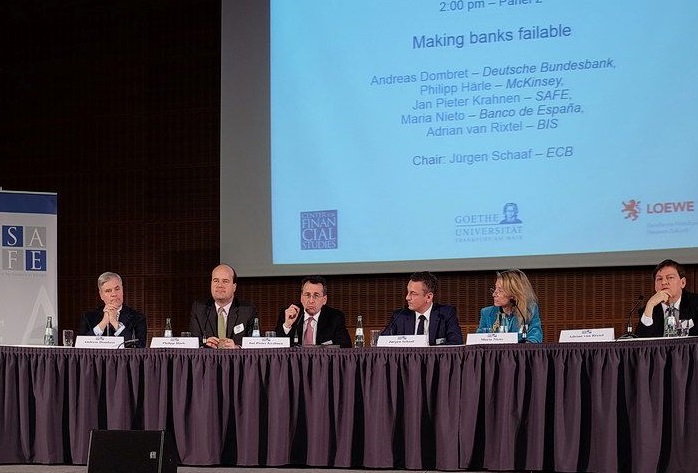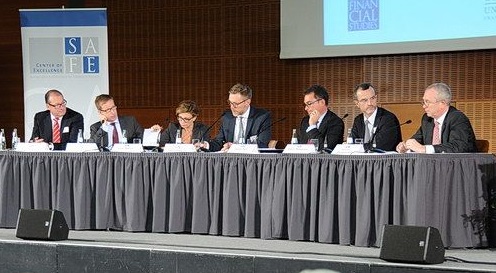On 29 November 2013, the first Frankfurt Conference on Financial Market Policy took place. High-level regulators and industry representatives discussed the challenges their institutions currently face in implementing recent reform proposals that can be subsumed under the term Banking Union. The one-day event was organized by the Policy Center of the Center of Excellence SAFE. It will be established as a yearly event. Over 250 participants from more than 15 countries, among them high-level researchers and decision-makers from central banks, supervisory institutions and the financial industry, attended the event held at Goethe University in Frankfurt and seized the opportunity to address the speakers with their own insights and questions.
 The audience was welcomed by Rainer Klump, Vice President of Goethe University, and Jan Pieter Krahnen, Director of SAFE. In the following keynote address, Yves Mersch, Member of the Executive Board of the European Central Bank (ECB), stressed the main pitfalls the current attempts to reform the financial system are facing: First, the competitiveness differentials between member states of the European Union; second, the high public and private debt levels; and finally, the institutional barriers to reform. Mersch stressed that economic recovery will depend on overcoming these obstacles.
The audience was welcomed by Rainer Klump, Vice President of Goethe University, and Jan Pieter Krahnen, Director of SAFE. In the following keynote address, Yves Mersch, Member of the Executive Board of the European Central Bank (ECB), stressed the main pitfalls the current attempts to reform the financial system are facing: First, the competitiveness differentials between member states of the European Union; second, the high public and private debt levels; and finally, the institutional barriers to reform. Mersch stressed that economic recovery will depend on overcoming these obstacles.
The first of three ensuing panel sessions dealt with “One market, one supervisor? Underwriting safety and soundness of EMU banks”. The session was chaired by Hans-Helmut Kotz, Program Director of the SAFE Policy Center. Ignazio Angeloni, Director General Financial Stability of the ECB presented the design of the ECB’s comprehensive balance sheet assessment. According to Angeloni, the goal of the assessment is foremost to increase the level of transparency and thereby re-install confidence in the financial system. In his view, the assessment will serve as a testing ground for the Single Supervisory Mechanism (SSM), which it is preparing. John Berrigan, Director for Financial Stability, Economic and Financial Affairs in DG ECFIN of the European Commission, underlined that the SSM alone will not suffice to sever the link between bank risk and sovereign risk. He argued that the SSM needs to be complemented by a resolution framework that is based on a common rulebook and has access to a single resolution fund.
 Vítor Gaspar from the Banco de Portugal added that the elements of the Banking Union are not only important for stabilizing the financial markets but also essential for overcoming financial fragmentation and thereby enabling the transmission of monetary policy. Charles Goodhart, Director of the Financial Regulation Research Program at the London School of Economics, warned that current micro-prudential measures lead to banks tightening their balance sheets. From a macro perspective, a deleveraging is problematic as investments are badly needed. Adam Posen, President of the Peterson Institute for International Economics in Washington, underlined the need to have a strong centralized body for supervision, resolution and also deposit insurance in the euro area. In his view, it is due to a lack of proper instruments for fiscal transfers in Europe that the recapitalization of banks is not working. A lively debate ensued around the question of whether the reform measures now being implemented correspond to the conceptual ideas originally laid out for the banking union.
Vítor Gaspar from the Banco de Portugal added that the elements of the Banking Union are not only important for stabilizing the financial markets but also essential for overcoming financial fragmentation and thereby enabling the transmission of monetary policy. Charles Goodhart, Director of the Financial Regulation Research Program at the London School of Economics, warned that current micro-prudential measures lead to banks tightening their balance sheets. From a macro perspective, a deleveraging is problematic as investments are badly needed. Adam Posen, President of the Peterson Institute for International Economics in Washington, underlined the need to have a strong centralized body for supervision, resolution and also deposit insurance in the euro area. In his view, it is due to a lack of proper instruments for fiscal transfers in Europe that the recapitalization of banks is not working. A lively debate ensued around the question of whether the reform measures now being implemented correspond to the conceptual ideas originally laid out for the banking union.
The details of the common resolution framework were discussed in the second panel, entitled “Making banks failable” and chaired by Jürgen Schaaf, Counselor to the Executive Board of the ECB. The panelists addressed the need to differentiate between financial institutions which are “going-concern” and those which are “gone-concern”. In the context of a bank recovery, for instance, the bail-in bond could take on the form of a contingent convertible (coco-) bond. Andreas Dombret, member of the board of Deutsche Bundesbank, stressed the importance of agreements between home- and host-authorities in the resolution of cross-border banks. Philipp Härle, Director at McKinsey & Company, praised the fact that “living wills” have forced contingency planning by banks. Jan Krahnen made the point that bail-in has not been used in notable bank resolution cases because the authorities fear contagion effects. Krahnen asked for enhancing the resolution regulation by establishing that the holders of subordinate bank debt cannot be other banks. In his view, it could be a task for the new central supervisory institution to monitor the bail-in-ability of subordinate bank debt. Maria Nieto, Associate to the Director General Banking Regulation and Financial Stability at Bank of Spain, underlined the view that for the bail-in tool to be effective, visible market signals are necessary. She therefore considers it paramount that the resolution framework be transparent regarding triggers for bail-in. Adrian van Rixtel, Senior Economist in the Bank for International Settlements, broadened the discussion by reminding the panel and the audience that there still remains an open question as to the core business of banks. The legislation on banking separation has proceeded in several member states and a European answer is still outstanding.
Andreas Dombret, member of the board of Deutsche Bundesbank, stressed the importance of agreements between home- and host-authorities in the resolution of cross-border banks. Philipp Härle, Director at McKinsey & Company, praised the fact that “living wills” have forced contingency planning by banks. Jan Krahnen made the point that bail-in has not been used in notable bank resolution cases because the authorities fear contagion effects. Krahnen asked for enhancing the resolution regulation by establishing that the holders of subordinate bank debt cannot be other banks. In his view, it could be a task for the new central supervisory institution to monitor the bail-in-ability of subordinate bank debt. Maria Nieto, Associate to the Director General Banking Regulation and Financial Stability at Bank of Spain, underlined the view that for the bail-in tool to be effective, visible market signals are necessary. She therefore considers it paramount that the resolution framework be transparent regarding triggers for bail-in. Adrian van Rixtel, Senior Economist in the Bank for International Settlements, broadened the discussion by reminding the panel and the audience that there still remains an open question as to the core business of banks. The legislation on banking separation has proceeded in several member states and a European answer is still outstanding.
The third panel turned to the question: “What’s up for banks – and their clients”. This panel, chaired by Andreas Hackethal, Professor of Personal Finance at Goethe University, brought up controversial arguments regarding the responsibility of banks for the financial crisis. Lutz Diederichs, Member of the Management Board of Hypo Vereinsbank – UniCredit Bank AG, protested against the high and contradicting expectations regulators and consumers have of banks.  Joachim Nagel from the Executive Board of the Deutsche Bundesbank criticized the self-pity displayed by banks and stressed that the reasons for why regulation is being intensified are the risks that accumulated in bank products and activities before the crisis. Sylvie Matherat, Deputy Director General of the Banque de France, added that the current regulatory efforts are not about “punishment” for the crisis but about getting the regulation right. Thierry Philipponnat from Finance Watch in Brussels quoted the Liikanen Report in saying that only 28 percent of the bank assets are dedicated to lending to the non-financial sector and households, prompting the question whether the financial system is foremost about serving the economy and society. The panel was completed by Karl-Peter Schackmann-Fallis, Executive Member of the Board of the German Savings Banks Association, and Michael Hüther, Director of the Cologne Institute for Economic Research (IW Köln).
Joachim Nagel from the Executive Board of the Deutsche Bundesbank criticized the self-pity displayed by banks and stressed that the reasons for why regulation is being intensified are the risks that accumulated in bank products and activities before the crisis. Sylvie Matherat, Deputy Director General of the Banque de France, added that the current regulatory efforts are not about “punishment” for the crisis but about getting the regulation right. Thierry Philipponnat from Finance Watch in Brussels quoted the Liikanen Report in saying that only 28 percent of the bank assets are dedicated to lending to the non-financial sector and households, prompting the question whether the financial system is foremost about serving the economy and society. The panel was completed by Karl-Peter Schackmann-Fallis, Executive Member of the Board of the German Savings Banks Association, and Michael Hüther, Director of the Cologne Institute for Economic Research (IW Köln).
 In his concluding remarks, Ignazio Visco, Governor of the Bank of Italy, distinguished between the 2007 crisis in the financial industry, caused by a lack of proper regulation, and the euro area government crisis. In his view, single countries need to implement the required structural reforms in order to “put their house in order”. The ECB meanwhile has intervened a number of times to repair the transmission mechanism of monetary policy. He argued that the banking union will improve the situation, and supported the idea of a single supervisory authority.
In his concluding remarks, Ignazio Visco, Governor of the Bank of Italy, distinguished between the 2007 crisis in the financial industry, caused by a lack of proper regulation, and the euro area government crisis. In his view, single countries need to implement the required structural reforms in order to “put their house in order”. The ECB meanwhile has intervened a number of times to repair the transmission mechanism of monetary policy. He argued that the banking union will improve the situation, and supported the idea of a single supervisory authority.

